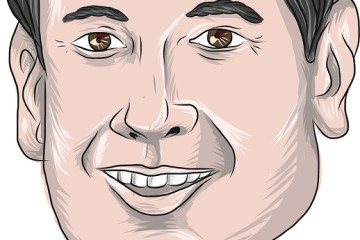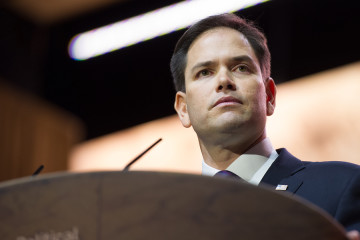A No-Party U.S. Presidential Candidate Rises: Leonid Bershidsky

published Oct 25th 2016, 8:00 am, by Leonid Bershidsky
(Bloomberg View) —
The U.S. presidential election is not all about Donald Trump’s outrages or Hillary Clinton’s positioning as the the lesser evil. As an outside observer, I see hope in some Americans’ quixotic resolve to stand up to the ugliness of the main race: These efforts could grow into more politically effective movements by the next election cycle.
In Boise, Idaho, this weekend, I watched people packed into a high school auditorium warm to a ticket most Americans haven’t even heard of: Evan McMullin and Mindy Finn. McMullin, a 40-year-old former Central Intelligence Agency operative, Goldman Sachs banker and congressional aide, has only been running for president for 11 weeks. He hasn’t even raised $1 million. Yet, according to polls, he was even with Trump and Clinton in Utah, the state where he was born. One poll even showed him ahead. He wasn’t just the first third-party presidential candidate with a chance of winning a state since George Wallace in 1968 — he’d be the first candidate in U.S. history to do so without a party affiliation. If he manages this, he’d have a platform to try to revamp the right flank of American politics — his project after what he sees as an inevitable Clinton victory.
Shoestring Campaign
The crowd at Boise High School was merely curious at first, grinning at McMullin’s leaflets, which had his brief bio on one side and the lineup of the Boise State Broncos on the other. McMullin later told me they’d been printed for distribution at a football game and there were some left over for the rally: The campaign is run on a shoestring; the candidate and I stayed at the same cheap hotel.
People laughed and clapped when Finn, a 35-year-old former Twitter executive and consultant to the presidential campaigns of John McCain and Mitt Romney, admitted she hadn’t had plans to run for vice president this year “or ever.” But the mood got more serious when she and McMullin explained why they decided to run: They’d waited and waited for a big-name conservative to come forward and stand against Trump and Clinton. When none appeared, they despaired and decided to make a go of it themselves, just to show, as McMullin said, that there were “millions of Americans more qualified to be president than Trump or Clinton.” That was a sentiment the audience shared. Lines formed at the end of McMullin’s short speech — one to have pictures taken with him, a regular occurrence at his campaign stops in the Mountain West, and another one to donate to his campaign, which subsists on these contributions — less than $40 on average. Capacity crowds at every venue where he has appeared since making a dent in the Utah polls ensure that he can go on.
McMullin says he voted for Senator Marco Rubio in the Republican primary. “He was the best on national security issues and I thought he would be successful at bringing in people of different races and religions into the conservative movement.” But he would have backed any Republican candidate except Trump, whom he called a racist, an enemy of religious freedom and of everything a true conservative holds dear, from the Second Amendment to the right to life. “I don’t trust the Donald Trump who’s running for president,” he said. “I trust the Donald Trump before he was running and his entire life.”
McMullin says Trump harnessed the feelings of people left behind by trade, automation and ultimately the Republican Party itself. “He took these people’s frustration and turned it into anger and hate and that drove his momentum even further,” McMullin said. “And as he did that, you saw leaders of the Republican Party join him because they saw political opportunity in it and that gave him even more opportunity, and here we are with Donald Trump as our nominee.”
When Trump won the nomination, McMullin was working as policy director for the House Republican Conference, the party’s congressional caucus. He had access to leading lawmakers, and he watched with mounting frustration as they either fell in behind Trump or refused to oppose him. “They told me Trump’s supporters would send them angry tweets if they did,” McMullin told the crowd in Boise, to laughter and jeers.
The former CIA agent, who ran intelligence and counter-terrorism operations in the Middle East, approached a group called Better for America, which had been casting around for an anti-Trump conservative candidate and trying to secure ballot spots for a knight in shining armor. He said he would have served whoever was picked. But the group couldn’t find anyone with even minor name recognition. So McMullin took the plunge, setting up his election headquarters in Utah and trying to get on the ballot everywhere he could — mostly as a write-in. He raised about $300,000 in the first month, then almost nothing in the month that followed because few believed he stood a chance. He says the trickle of funding increased to a more respectable stream after the Utah polls.
Not a Spoiler
McMullin’s plan was to win a state or two in the Mountain West. Idaho and Wyoming, as well as Utah, have large Mormon populations, and McMullin, himself a Mormon, knows his coreligionists have a hard time accepting Trump even as an alternative to Clinton. Mormons, with their memory of persecution, haven’t taken kindly to Trump’s early promises to keep Muslims out of the U.S.
Trump was expected to carry Utah, Idaho and Wyoming, all deeply conservative states, and McMullin may deny him victory at least in Utah (polls in Idaho and Wyoming don’t track him yet).
If the race between Trump and Clinton were close, a victory even in one state would allow McMullin and Finn a theoretical chance at the White House because if neither candidate gets a majority of electoral votes, the 12th Amendment of the Constitution calls for Congress to pick the president. That was their original long-shot strategy — such a scenario hasn’t played out since 1825. McMullin is the first to admit that this “does appear less likely now”: He is certain Clinton will win by a landslide. So is Finn.
“Clinton is within three points of Trump in Texas, my home state,” Finn told me. “It shows the damage he has done to the Republican Party.”
If the race ends as they predict, the votes cast for McMullin won’t change anything, but he he and Finn hope to “send a strong message to Washington, to the Republican Party and to conservatives that something new is happening and that there’s a new conservative movement that we’re building.”
I’ve heard the word “movement” from a number of candidates in this campaign — Bernie Sanders, John Kasich, Ted Cruz, and, of course, Trump. Sanders and Trump did succeed in forming genuine movements. On a small scale, McMullin has done so, too, at least in the Mountain West. Hundreds of people, far more than expected, show up at his volunteer recruitment events. He talks of plans to keep the organization alive after Election Day, perhaps even turn it into a party. He says:
Both of us are skeptical that the Republican Party will change in a good way after this election. It will learn that it needs to be able to appeal to women, to minorities and to millennials, and they’re doing terribly with that in this election. They’re not getting better. They’re getting worse. I have been involved with the Republican Party at high levels and tried to change the party, and we see that it really struggles. Every week it seems like there’s another Republican member of Congress saying something terrible about women. I mean, they can’t help themselves. Now that Donald Trump supporters are more empowered than they’ve ever been, that doesn’t suggest a positive future for the Republican Party to me. Most likely over time they will shrink in size and become a white nationalist party.
That’s not a direction McMullin wants to go. He and his running mate may have given up on modernizing the party, but not on conservative politics.
Conservatism for Millennials
After months of listening to U.S. Republican politicians thunder about gay marriage and abortion, I was surprised at the seeming mildness of McMullin’s message on these issues. He talked about working with liberal groups to minimize the number of elective abortions, and said that the Supreme Court had ruled on gay marriage so it’s time to move on. (One reason for the latter stand may be that McMullin’s mother is now married to a woman.) But when I asked him if his was a somewhat watered down version of conservatism, he pushed back hard.
“If I became president I’d appoint Supreme Court justices who would, I hope, overturn Roe v. Wade,” he said. “So that would be a litmus test for me.”
His stands don’t differ much from Republican orthodoxy: He calls for entitlements reform to cut the deficit and government debt, and wants to replace Obamacare with a cheaper system that would do more to foster competition among insurance companies and downsize government in general. His biggest objection to Clinton, apart from the litany of accusations stemming from the e-mail scandal, is that she’s a government expansionist. In the traditional Republican vein, he’s more of a national security hawk than the Democratic nominee, and rejects what he sees as Trump’s affection for President Vladimir Putin.
Unlike either of the candidates, McMullin, who worked in the Middle East for most of his 11 years at the CIA, has a coherent plan for Syria. It involves full radar coverage of the country to monitor and report Russian and Syrian regime airstrikes along with the creation of no-fly zones in the north and south of the country to protect moderate Syrian rebels. The U.S., he says, is perfectly capable of building a local force that could hold its ground against President Bashar al-Assad on the battlefield and force him to negotiate his departure. “As far as the moderate Syrians are concerned, I am really frustrated when policy makers say, ‘They are weak, we can’t really work with them,’” McMullin says. “Oh yeah, they are weak because we don’t support them. How are they supposed to fight this battle on their own?”
Both McMullin and Finn sound capable of discussion and compromise, of accepting others’ views rather than imposing their own. They are not harsh ideologues or politicians intent on hitting their talking points. When I remarked on that, McMullin said:
I think generally there’s a hunger for authenticity. We’re honest about our goals, we’re honest about the chances, we’re honest about what we stand for. That is not the usual thing, and we know that because we come from that world: We’ve been top advisers to politicians.
As I listened to this pair of political novices talk about broadcasting their events on the social networks or using Facebook to build awareness, I imagined one of the next elections — perhaps not the one in four years, but surely by 2024 — in which they and their peers on the left would argue out the issues instead of slinging mud. I could easily imagine them working toward political compromises, too. By being genuine and understated, they would perhaps restore the credibility the U.S.’s democracy has lost this year.
On both sides of the line dividing the American right and left, there is a yearning for something different, an earnest belief in working to make the country better. Perhaps there’s a chance that it won’t be corrupted by the realities of politics: The negative example of the Trump v. Clinton race is there for all to see and avoid.
This column does not necessarily reflect the opinion of the editorial board or Bloomberg LP and its owners.
To contact the author of this story: Leonid Bershidsky at lbershidsky@bloomberg.net To contact the editor responsible for this story: Max Berley at mberley@bloomberg.net
For more columns from Bloomberg View, visit Bloomberg view
copyright
© 2016 Bloomberg L.P





No Comment